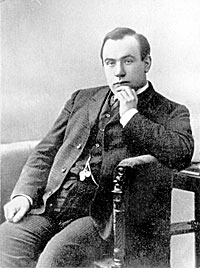Sergei Ivanovich Simin
Sergei Ivanovich Zimin ( Russian Сергей Иванович Зимин ; born June 21 . Jul / 3. July 1875 greg. In Zuyevo ; † 26. August 1942 in Moscow ) was a Russian impresario and opera director .
Life
Simin came from a altgläubig - feodosijanischen merchant family. His father Iwan Nikititsch Simin (1818–1887) founded the important stock corporation “Sujewo- Manufaktur- Gesellschaft IN Simin” in 1884 .
Simin graduated from Moscow Business School in 1896. He was enthusiastic about music and took singing lessons from Nikolai Kedrow , Anton Barzal and NP Miller. He constantly attended the "Private Russian Opera" Sawwa Mamontov and took part in Miller's singing evenings. When Mamontov was arrested in 1899 as a result of his bankruptcy , Simin received a proposal from Mikhail Ippolitow-Ivanov to lead the now abandoned opera company. Simin refused because of his lack of experience, but felt obliged to preserve the tradition of the Mamontow opera. In 1902 he organized opera music concerts in the Kuskowo Garden Theater . In early 1903 his popular concerts in the zoo , in Sokolniki Park and on the stages of the Society for Popular Entertainment followed. In the summer of 1903 he put on an opera performance in Kuskovo Park, and soon he was one of the partners in the opera company of the famous opera singer Mikhail Medvedev . Simin also organized teaching concerts. In 1904 he traveled to Vienna , Berlin , Naples , Rome and Paris to study . After his return he assembled an opera company in Moscow in 1904, from which the Simin Opera Theater emerged, and founded a museum of opera art.
After the October Revolution , the Simin Theater was nationalized. Simin was 1918 and 1921-1923 artistic advisor to the Moscow Art Theater (MChAT) . He was also head of the MChAT's music library from 1918 to 1922. 1919–1920 he was a member of the board of directors of the Small State Opera. With the beginning of the New Economic Policy (NEP) , art revived a little. In 1922 Simin reopened a theater and founded the joint stock company “Erste Freie SI Simin-Oper”, which performed more than 20 operas in two years, including Tchaikovsky's Mazeppa and Wiktor Dolidses Keto and Kote . After the Russian Civil War , many intellectuals were forced to leave Russia, so that interest in opera decreased. In 1924 the theater was finally closed. 1925–1928 the theater served as an experimental stage. From 1922 to 1935 it was the Second State Opera and Ballet Theater . In 1936 it became a branch of the Bolshoi Theater . Simin lived in the building until his death and was artistic advisor to this branch opera.
Simin was buried in Moscow's Preobrazhenskoye cemetery . In 1996 a Simin singing competition was held on the occasion of the 120th birthday. In the Glinka Music Museum, Simin's granddaughter Wera Mikhailovna Simina is working on the publication of Simin's diaries.
Individual evidence
- ↑ a b Article Simin Sergei Ivanovich in the Great Soviet Encyclopedia (BSE) , 3rd edition 1969–1978 (Russian)
- ↑ Кругосвет: ЗИМИН, СЕРГЕЙ ИВАНОВИЧ (accessed July 20, 2017).
- ↑ a b Зимина В .: Опера Зимина. От мануфактуры до театра . Moscow 1998.
- ↑ Вера Зимина: В Москве хотят уничтожить уникальное здание Оперы Зимина (accessed July 20, 2017).
| personal data | |
|---|---|
| SURNAME | Simin, Sergei Ivanovich |
| ALTERNATIVE NAMES | Зимин, Сергей Иванович (Russian) |
| BRIEF DESCRIPTION | Russian violinist and conductor |
| DATE OF BIRTH | July 3, 1875 |
| PLACE OF BIRTH | Sujewo |
| DATE OF DEATH | August 26, 1942 |
| Place of death | Moscow |

